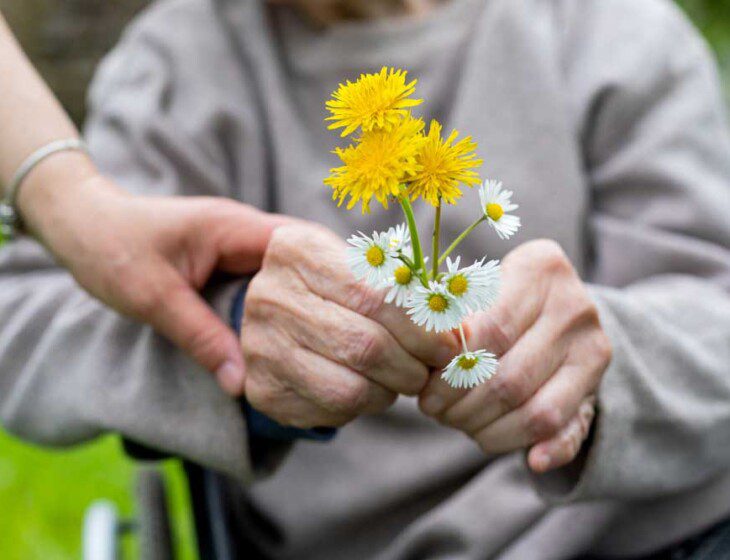Have you ever found yourself taking a deep, relaxing breath when encountering a beautifully maintained garden, park, or other outdoor space? Have you ever noticed that in these moments, the calm, refreshing atmosphere invigorates your senses, clears out your mind, and boosts your mood? Studies have shown that spending time outdoors can potentially enhance cognitive function, reduce anxiety, and improve your mood. In seniors, these restorative effects may also help maintain cognitive function and memory.
Now, imagine a garden designed specifically to stimulate sensory experiences therapeutically. That’s the idea behind a sensory garden, which stands out among the many types of sensory activities for seniors due to its multitude of positive effects. More and more senior living communities are offering sensory gardens and therapeutic gardening as a way for residents to experience the beneficial effects of these engaging outdoor oases. In this article, we’ll take a look at the benefits of sensory gardens for seniors and the therapeutic effects they can provide.
What Is a Sensory Garden?
Simply put, a sensory garden is a cultivated greenspace designed specifically to engage sight, sound, smell, touch, and taste in significant and intentional ways. Sensory gardens can have a calming effect on seniors experiencing anxiety. They can also help stimulate the minds of those with cognitive deficiencies, as memories are so closely linked to our senses. Here are a few ways that a thoughtfully designed sensory garden can stimulate each of the five senses.
-
- Sight. Sight is usually the first thing we think of when a garden comes to mind, making color an important part of any sensory garden. Colors might be seasonal or they may be designed to maximize contrast or clustered in groups. Colorful butterflies and birds may also be attracted to plant nectar or certain colors to the delight of visitors. Other sources of visual interest may include water features, landscape lighting, brick, gravel, or stone.
- Smell. Smell is deeply linked to memory, which is why sensory gardens should include a variety of plants offering differing aromas. Everything from floral and foliage smells to herbs like mint, rosemary, and basil can arouse and awaken the memory center of the brain.
- Sound. The sounds of flowing water are known to activate the parasympathetic nervous system, which in turn helps the mind and body enter into a state of relaxation. Sensory gardens can pair the sounds of trickling fountains and streams with the melody of native birds for a combination that’s a soothing retreat into the natural world.
- Touch. From the softness of different flowers and leaves to smooth pebbles adorning the walkway, implementing different textures within a sensory garden can create opportunities for both visual and tactile stimulation.
- Taste. Edible flowers, fragrant herbs, and fresh produce can all be grown in a sensory garden to enable seniors to explore taste during their visit.
Sensory Garden Benefits
The benefits of a sensory garden can vary depending on how it’s designed. Some gardens are meant to stimulate and awaken the senses, while others provide a calming and relaxing atmosphere. But no matter the focus, all sensory gardens can offer therapeutic benefits.
Outdoor Activity
Sunshine and fresh air can help ward off cabin fever and help stimulate the mind and body in positive ways. Empowering seniors to partake in therapeutic gardening can elevate the benefits of sensory gardens through the addition of physical movement. Studies show that, for seniors who are able, helping maintain a garden or green space can provide a sense of purpose, motivation, and a host of therapeutic benefits as they tend to the many plants and sensory features of the garden. More than this, getting outdoors and interacting with peers through outdoor activities can lower the risk of dementia or cognitive decline.
Decreased Anxiety
The soothing effects of interacting with nature can greatly benefit seniors dealing with anxiety or degenerative cognitive conditions such as Alzheimer’s or other forms of dementia. Such gardens can be designed as a calming and relaxing oasis, providing a natural environment for patients and visitors to relax and recharge. Participating in the growth and care of sensory gardens can also encourage staying active, meaning that the gardening benefits for seniors extend into physical well-being. As physical activity may support minimizing symptoms of anxiety and depression in seniors, the overall effect of sensory gardens can be powerful.
Memory Stimulation
Another benefit for seniors experiencing cognitive decline is the way a sensory garden can stimulate memories. The sight of a tree blowing in the wind, the sound of burbling water, and the aroma of flowers and herbs are all powerful memory triggers. And since the sights, sounds, and smells of nature don’t change over time, they can bring familiarity to patients who often feel like things are always changing.
Revive Your Senses and Embrace Nature at Claridge Court
The manicured green spaces at Claridge Court are designed to delight and inspire, infusing your day-to-day life with the benefits of nature. As a luxury senior living community in Prairie Village, KS, Claridge Court places the well-being of you or your loved one first through holistic services such as tailored wellness programs, elegant dining, ample amenities, and community activities.
Ready to find your own personal oasis at Claridge Court? Get in touch and explore your premier senior living options today.




